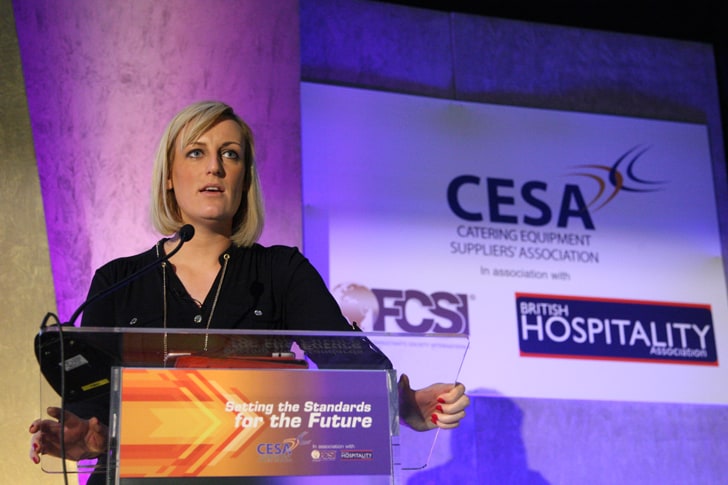
Hosted by BBC business reporter Steph McGovern on 15 November at Savill Court Hotel in Windsor, UK, CESA’s annual conference, partnered with FCSI and the British Hospitality Association (BHA), was an event boasting an eclectic line-up of speakers addressing a broad range of topics. Sessions on the state of the UK economy sat alongside talks on the future of F&B in retail, Business Information Modelling (BIM) in action, where best to direct your IT budget and effective ways to cut energy use and cost in the kitchen.
Proceedings were introduced by CESA chairman Nick Oryino and FCSI’s UK & Ireland chair Niccola Boyd-Stevenson FCSI. Both stressed the great strides in collaboration between the two bodies in recent years with Boyd-Stevenson highlighting that CESA and FCSI initiatives on BIM, Tri-Education and carbon calculators show both organisations are “striving forward to set standards in the industry, together.”
One of the highlights speakers, Dennis Turner, former chief economist of HSBC bank, kicked the day off with an upbeat presentation about the UK economy that demonstrated that for “four years or more the economy has been in recovery mode and on the mend from a deep recession.”
While the UK has achieved three consecutive quarters of positive growth and the “recovery looks well grounded”, Turner drew attention to the lowest interest rates for over 300 years coupled with huge fiscal expansion from government and still predicted further “bumps in the road”, highlighting a fragile consumer sector and an export dependency on a eurozone that remains largely in the doldrums. The dislocation of Europe remains, said Turner, “a frightening prospect.” So will the Euro survive? It will, according to Turner, but not necessarily with the same members, as he predicted further centralisation.
Turner also predicted that UK export growth would start to outpace import growth. He suggested that if the UK wants to remain a global player it must look again at its manufacturing focus, suggesting it was still an “underestimated” industry. “It’s about doing more with less firms. It used to be about bulk, now it’s about added value,” said Turner. He added that the UK needed to continue to “compete on the basis of quality, not cost.”
Following an excellent case study by Marks & Spencer’s head of hospitality Jason Danciger on the future of foodservice in multiple retailing, CESABIM consultants Stewart Millar and Joseph Smith gave a cogent presentation on the subject of BIM and its implication for the industry. The UK government has legislated that all public funded projects must be undertaken using BIM software by 2016. So the CESABIM solution, developed by CESA in partnership with BIM specialist Schematic Ltd, is proving to be a useful and practical way for manufacturers, designers and suppliers of catering equipment to produce BIM models that can be uploaded into any BIM software format. BIM offers “better collaboration, a focus on better design, projects savings of time and cost and coordination of information and increased productivity,” said Millar.
David Terrar of techUK gave a whistlestop tour of the current IT landscape and why the current ‘big shift’ or ‘digital disruption’ in technology is important for any business to understand as it learns how to direct its IT budget. Every business needs “a social media strategy that is incorporated into its overall comms strategy,” according to Terrar.
Vita Whitaker presented on the Tri-Education CPD Kitchen & Equipment Design joint initiative supported by CESA, CEDA and FCSI, highlighting the diverse range of skills and products these organisations contribute to a “robust supply chain”. The aim of the initiative is, said Whitaker: “to continue up-skilling our existing workforce, increasing staff retention and attracting new people into our associations.”
CESA’s vice chairman Simon Frost then announced the latest roll-call of CFSP (Certified Foodservice Professional) graduates. CFSP is a qualification relevant to operators, consultants, distributors and catering equipment companies with over 270 industry professionals in the UK already being accredited.
Andrew Archer, managing director of Dewberry Redpoint, then canvassed opinion from delegates on their predictions of future buying intentions of group operators. This feedback was then compared and contrasted with findings from a recent survey of 265 foodservice operators, presented by Florin Ivan of Canadean Custom Solutions. According to the research survey, the coffee and sandwich shops sector is predicted to grow substantially (93% Of those interviewed felt the sector would grow in the UK by more than 5% in 2014). Additional growth was predicted to come in retail, workplace and contract catering amongst others.
Dominic Burbridge, associate director of Carbon Trust, gave an engaging presentation about the success of the ‘Cut Costs and Carbon Calculator for the catering industry since its launch in June 2013. According to Burbridge, in the UK more than 8 billion meals are served each year across 260,000 catering sites and many of these businesses could achieve savings of up to 30% by using the Carbon Trust’s publically available spreadsheet model. “Even 10% savings are a massive achievement,” he said. “It’s a benchmarking tool, a selling tool, an innovation tool, a catering design optimisation too and a menu development and behavioural change tool,” said Burbridge of the calculator.
A lively keynote session from Alastair Campbell, former communications strategist and chief spokesman to Tony Blair, rounded off an informative and engaging event.
Michael Jones

